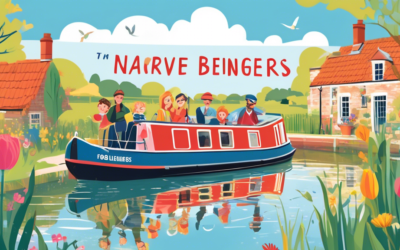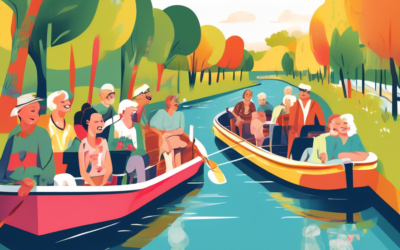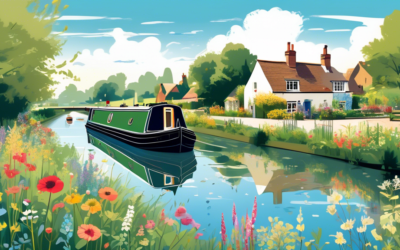Embarking on a Nautical Adventure: Essential Boating Etiquette for Beginners
Imagine gliding through serene waters, surrounded by breathtaking landscapes that unfold at every turn. This is the allure of canal boating, a cherished activity that invites adventure and relaxation in equal measure. The canals of the North West of England, including the celebrated Four Counties, Cheshire Ring, and Llangollen Canal, offer a mosaic of historical landmarks, idyllic countryside, and charming towns, making them a boater’s paradise. Before setting sail on this enchanting journey, it’s crucial to acquaint yourself with the unwritten code of the waterways – boating etiquette. Observing these norms ensures a harmonious and enjoyable experience for everyone on the water.
Navigating the Waters with Grace: A Guide to Boating Etiquette
Boating etiquette might seem daunting to beginners, but it’s essentially about being considerate and safe. Here are foundational principles that will steer you in the right direction, ensuring your canal boating adventure is delightful for you and respectful towards fellow boaters and the environment.
1. Mastering the Art of Passing
Canal boats travel at a leisurely pace, allowing ample time to soak in the surroundings. However, there might be occasions when you need to overtake another boat or be overtaken. Remember, patience is key. Signal your intention by sounding your horn twice and wait for acknowledgment. Always pass on the left-hand side (port), and reduce your speed to minimize wash. If you’re on the receiving end, reduce your speed to facilitate a smoother pass. A friendly wave of thanks, whether giving way or after overtaking, goes a long way in fostering goodwill among boaters.
2. The Courtesy of Mooring
Finding the perfect spot to tie up for the night is one of the delights of canal voyaging. When mooring, especially in popular stretches such as the picturesque Llangollen Canal, ensure you’re not encroaching on private property or designated no-mooring zones. Use designated mooring spots when available and keep a considerate distance from other boats to avoid overcrowding. If space is scarce, it’s polite to ask nearby boaters if they wouldn’t mind moving slightly to make room. Remember to always leave enough space for other boats to pass safely.
3. Respecting Nature’s Harmony
The canals wind through some of the most stunning landscapes the North West has to offer, habitats for diverse flora and fauna. Maintaining this natural beauty requires a commitment from all boaters. Dispose of waste responsibly at designated disposal points and avoid disturbing wildlife. Keeping noise to a minimum, especially in the early mornings and late evenings, ensures that both fellow boaters and local wildlife can enjoy the tranquility of the canals.
4. The Ethics of Lock Use
Locks are an integral part of canal boating, offering an engaging way to navigate changes in elevation. The Cheshire Ring, with its numerous locks, provides a fantastic opportunity to practice lock etiquette. Always check if another boat is approaching the lock before you enter, and if so, communicate to see who is closer or could use the lock first. Sharing locks with other boats when possible is not only efficient but also a chance to meet fellow boaters and exchange stories. After using a lock, make sure the gates are closed and the water is drained or filled for the next user, unless you’re aware another boat is close by and planning to use it.
5. Bridges and Tunnels: Proceed with Care
The historic bridges and tunnels along the canal routes add to the charm and challenge of the journey. Approach these with caution, especially if they’re narrow or have limited visibility. Use your boat’s horn to signal your presence to boats that might be approaching from the opposite direction. In tunnels, it’s particularly important to keep to the right and proceed slowly. If you encounter a boat at a narrow bridge or tunnel entrance, the boat closest to the entrance generally has the right of way. However, always be prepared to negotiate passage and communicate clearly with any oncoming boats.
6. Fostering Community Spirit
The canal boating community is known for its friendliness and helpful spirit. Whether it’s assisting fellow boaters with mooring, offering advice on navigating locks, or sharing recommendations for local pubs and eateries along the canals, these interactions enrich the boating experience. Don’t hesitate to ask for help if you’re unsure about something, and always be willing to lend a hand to others. You’ll find that the camaraderie among boaters is one of the most rewarding aspects of canal cruising.
Setting Sail with Confidence and Courtesy
Embracing boating etiquette is not just about adhering to rules; it’s about cherishing the waterways and contributing to a culture of mutual respect and enjoyment. As you prepare for your journey through the scenic canals of the North West of England, from the tranquil waters of the Llangollen Canal to the historic stretches of the Four Counties and Cheshire Ring, keep these etiquette tips in mind. With a spirit of adventure and consideration, your canal boating experience will be filled with unforgettable memories, beautiful landscapes, and warm encounters. Happy boating!
Fancy a boat holiday – Check out Floating Holidays fleet for hire!






0 Comments